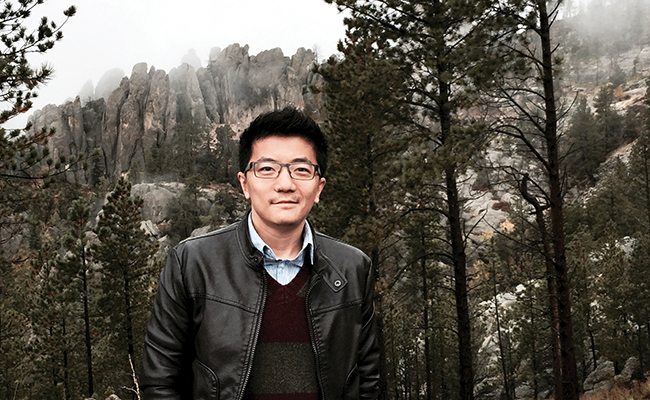Making predictions about anything, never mind a country as large and complex as China, is a fraught affair.
Damien Ma, whose day job sometimes includes making such prognostications, says it is gradually becoming more difficult. For many reasons—increased uncertainty, increased complexity, unclear data, shifting political winds—the “noise-to-signal” ratio in China has gone up. Added to that is a great proliferation of China punditry, as anyone and everyone seems to be weighing in. In this interview Ma tries to explain and cut through that noise to some degree.
Damien Ma is Fellow and Associate Director of the Think Tank at the Chicago-based Paulson Institute, which aims to strengthen US-China relations and promote sustainable economic growth, where he does economic and policy analysis. Ma is also a lecturer at the Kellogg School of Management at Northwestern University, and the co-author of In Line Behind a Billion People, which addresses scarcity and future economic growth in China, published in 2013.
Q. If one starts listing the macro economic problems in China—the slowing exports, the potential property bubble, capital flight, rising labor costs—it can pretty quickly become overwhelming. But for foreign business, what are the most important problems to understand, or perhaps a useful overall lens with which to look at the situation?
A. Worries about a lot of the accumulated problems that you have outlined, whether it is leverage, the property sector, or pressure on the currency, I think is partially a result of how people have assessed the first term of the new government under Xi Jinping. The government has not taken the drastic measures that were outlined in the reform document from the Third Plenum in 2013, and a number of observers I think are disappointed in the pace and the scope of the reforms so far.
In my view, Xi Jinping’s first term was defined almost exclusively by politics: anti-corruption and cleaning out the party and so on. But I am cautiously optimistic about his second term in terms of the economic reform agenda, and I wrote a piece not so long ago about that. I think if we see a bit of a pivot from the first term, and a doubling-down on the more broad set of reforms that were outlined in the Third Plenum document, that to me would bolster the confidence of both foreign and domestic businesses in the future trajectory of the Chinese economy.
The issue is how difficult those reform goals are to implement. There is no way they can avoid near-term pain, they want to put a floor on it, they don’t want growth to dip too low, but I think almost everyone anticipates near-term pain if they are going to seriously tackle some of the structural reform problems that need to be solved. But as I said, if they are willing to more meaningfully pursue reform in the second term, then I think that will give investors and businesses more confidence that they are moving in the right direction and that in a few years China will rebound to a more sustainable growth level.
Q. What is your personal feeling?
A. What I portrayed above is probably the most realistic, cautiously optimistic case I feel can actually happen. There are obviously people who disagree with me and there are different views out there about what Xi Jinping’s government will or will not do. But I do think if you look at what he said, and what he has been doing since coming into office in November 2012, it has been all about tackling issues within the Communist Party—that’s been almost the entire focus. And so the question for many people is this: Is that trying to serve some other end? If the answer is yes—that the political agenda is trying to serve some other end—then I would argue that end is trying to make sure the political consensus and the conditions are ready to facilitate the actual execution on some of these economic reforms.
Just think about it. What is the big remaining piece of economic reforms? It’s the state sector. That’s really what everybody is looking at. There are certainly a lot of problems in the state sector: That’s where all the corporate debt is building up, that’s where most of the wasted investment happens. But those big behemoth local and central SOEs, especially local SOEs, aren’t really allowed to exit the market because they are protected. So if you can deal with that particular area, which is the last remaining big area of reforms, that could potentially solve a lot of the problems in the Chinese economy. But to me that’s a political question and less of an economic problem, because they know what to do. It’s simply because they are state assets, that the problem inherently deals with politics. To me, you have to get the politics right if you are to lay the groundwork to realize some of these big, bold reforms. So that’s how I look at it: First term all politics, second term hopefully that political capital will be cashed in on implementing the more difficult and challenging reforms.
Q. There’s also certainly a lot of bright spots in the economy—for example in the tech industry, or advanced manufacturing. But it seems to me through some policy frameworks, such as “Made in China 2025,” foreign companies are increasingly being boxed out of them. First, what do you think? And second, how should foreign companies view and prepare for these initiatives?
A. In general for companies that either have been operating in China, or want to enter China right now, I think the most important thing is to psychologically prepare yourself to understand that, at the macro level, China is no longer a capital-scarce country—it’s primarily a technology-scarce market. So what it wanted back in the 1980s and 1990s when the first wave of FDI came in was just about capital: putting up plants and getting capital to its joint venture (JV) partners and so on.
But now that’s not what Chinese companies want—they want technology. That is obviously a pretty significant change, and each foreign company will have its own strategy for determining the right amount of technology to transfer. For example, maybe you agree to transfer some technology, but keep core technologies in your home country. Just to give you an illustration, take a look at the different strategies between Airbus and Boeing. It is clear that developing commercial airplanes is a big part of China’s industrial policy, not just for the aviation industry itself, but as an important national priority. China has had this goal to make a commercially viable aircraft that competes with the Airbus 320 and the Boeing 737 class of jets for quite some time. Since China was clear about what it wanted to do, Airbus’ strategy was actually to come in and co-build a plant and help China assemble some of the actual aircraft. Boeing chose not to do that. So then the corporate strategy question is: Will that play out in some way in terms of how Beijing thinks of market share for Boeing planes versus Airbus planes? The answer to that is far from clear.
Each company has to decide for themselves what’s acceptable to them. For example, will they limit themselves in market share if they are not willing to transfer certain technologies? If you are in a technology intensive and sensitive sector you might be a lot less willing to tolerate that. Or maybe you are willing to transfer under certain conditions, or perhaps develop a new intellectual property licensing regime. That is actually something people haven’t talked about too much: Can we come up with a more innovative IP regime where both sides, both the Chinese JV partner and the foreign entity, share the fruits of their innovation labor so to speak? New ways of managing IP like that are not being regularly tested at this point, but I think there is some potential there.
Q. Your job is to understand China as it is now, but it is also to make predictions. Of course that doesn’t always work out. You wrote a piece in 2012 that casted doubt on the future of China and Hollywood, and of course reality turned out differently. So in that light, what are your thoughts on the fraught nature of predicting anything with regard to China?
A. What’s that famous Yogi Berra quote? “It’s tough to make predictions, especially about the future.” So I take his point, it is indeed very hard! If you recall in my book a few years ago, In Line Behind a Billion People, we stayed away from concrete predictions, and instead tried to paint a few likely scenarios with various levels of probability.
In terms of the China field in general in the last few years, in the United States and to a lesser extent in Europe, the bulls and bears have been arguing non-stop with each other about the state of the economy, or the state of politics. They argue about whether the economy is going to collapse by tomorrow, or that China will be the biggest economy by “X” year. But I think the thing that is actually important to take from all that debate is that it is increasingly harder for people to zero in on what the key issues in China are. And the reason for that is the noise-to-signal ratio has gotten much, much higher. There’s a lot more noise now, and it takes a lot more work to find the signal. And that’s kind of how I view my job—anyone that has been doing this for some time is trying to figure out what the true signals are, and what are the less relevant factors that people just ought to dismiss. I try not to pay too much attention to the bulls and bears fighting with each other about what exactly GDP growth might be, for example. That kind of debate, to me, doesn’t help with actually understanding what’s happening in the Chinese economy very much. If anything, it obscures more than it elucidates. Because there is more uncertainty in China than we have seen in some time, in part because of what Xi Jinping has tried to do, the range of outcomes has become wider, and so it’s certainly more difficult to figure out exactly what could happen next. But this also means it is all the more important to think harder about what are these key variables that people really ought to be paying attention to, what are the real signals they need to highlight, and cut out the rest of the noise to really zero in on a few credible scenarios that make sense given the body of evidence.
To me the best way is to look at it at this point is to be as evidence-based as you possibly can. Of course that is often hard because data is a problem in China, and there are other factors. But to me that’s really the only viable way at this point. The level of noise itself makes it even more important for experts and analysts to really counter that effect with sharp, evidence-based credible analysis. We need to make sure we look at any issue in China in a more balanced, objective way.
Q. Why do you think the noise has increased so much? Do you mean noise in the data itself, or the noise of people pushing different perspectives on China at very high volume?
A. One important factor is the democratization of the China field—anybody can come in and say something about China now. Pundits comment on China, news media comment on China. The cost of entry for having a view on China is so low that basically anybody can have one. And then of course news cycles move fast, markets move fast, so there’s a lot of trying to catch up and keep pace with news cycles and markets that don’t necessarily include context. Much of that stuff to me is just noise. It doesn’t necessarily lead you to any clearer understanding of what’s actually happening.
Somewhat related to that point is China’s status as the world’s second-largest economy. It’s gotten a lot more “popular” in the global imagination, just like the United States has been for a very long time. And so just like people all over the world have an opinion on the United States, a lot of people now also hold some kind of opinion on China, rightly or wrongly. If you are a large and successful economy, and you are out there with a huge global footprint, people are going to have to grapple with you and scrutinize your policies and moves. That’s one of the challenges for China, and I don’t think the Chinese government quite realizes that yet, or at least it hasn’t done much to deal with it. A good question to ask is: Why have Americans said in Pew research surveys in the past few years that China is the biggest economy in the world? That’s inaccurate. But a lot of people thought that was the case, and there was a reason for that. China is increasingly being thought of as more powerful and significant than perhaps it wants to be, or is comfortable being perceived.




















